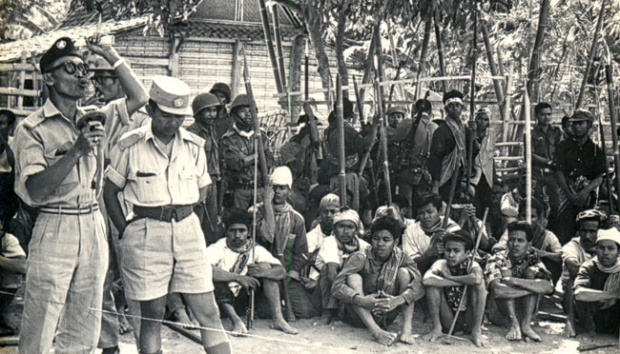The full impact of this week’s public release of newly declassified embassy files from the US government, relating to their knowledge and support of the mass killings that took place in Indonesia from 1965-1966, is yet to be seen. But, as human rights activists had hoped, the files may help spur a national dialogue and reconciliation between the victims of the tragedy and those institutions behind it.
Some of the most shocking information contained in the files pertains to the complicity of Indonesia’s most prominent Muslim civil society groups in the killings, including Muhammadiyah and Nahdlatul Ulama (NU). One cable from the US consulate in Medan detailed how Muslim preachers described the killings as a religious obligation and said preachers from Muhammadiyah were telling worshippers that communists were the “lowest order of infidel, the shedding of whose blood is comparable to killing chicken”.
Rather than denouncing the information contained in the documents as inaccurate or fake, the chairman of Ansor (the youth wing Nahdlatul Ulama), Yaqut Cholil Qoumas, said that they showed a need for national reconciliation and that Ansor would support it.
According to Yaqut, such a reconciliation would have to be done without coercion and begin with an understanding of the facts of what happened in 1965.
“Reconciliation can be done, however it must begin with historical recognition,” he told Tempo yesterday.
Yaqut did not deny Ansor’s involvement in the mass killings. But he said it was important to recognize the context of the situation and pressures within society at that time.
“We do not deny that there were Ansor cadres who, at that time, committed murder, because it was a wartime situation,” he said.
The chairman of the Muhammadiyah’s central executive board, Haedar Nasir, also said he supported the reconciliation efforts. But he said that those efforts must be done as part of a dialogue between many different institutions and groups. He said that creating such a dialogue would someday allow them to find a common ground.
“If a political approach is taken, whoever they are, then reconciliation in the case of 1965 will be a dead end,” Haedar said.
Regarding Muhammadiyah’s involvement in the mass killings, Haedar said Muhammadiyah members would have never committed such acts if it wasn’t justified in terms of saving the country.
“I think all elements of society were trying to quell the PKI rebellion at that time,” he said.
The Indonesian government has long resisted any attempts to get justice for victims of 1965, but in April 2016, the government did sponsor a symposium on the mass killings that gave the victims as well as military and government officials the opportunity to testify about that dark chapter in Indonesian history.
Despite hopes that the symposium would lead to a government apology or at least reconciliation, it instead caused a backlash and an increase in communist hysteria including the mob siege of a pro-democracy event that had been rumored to actually be a meeting in support of the long obliterated Indonesian Communist Party.




